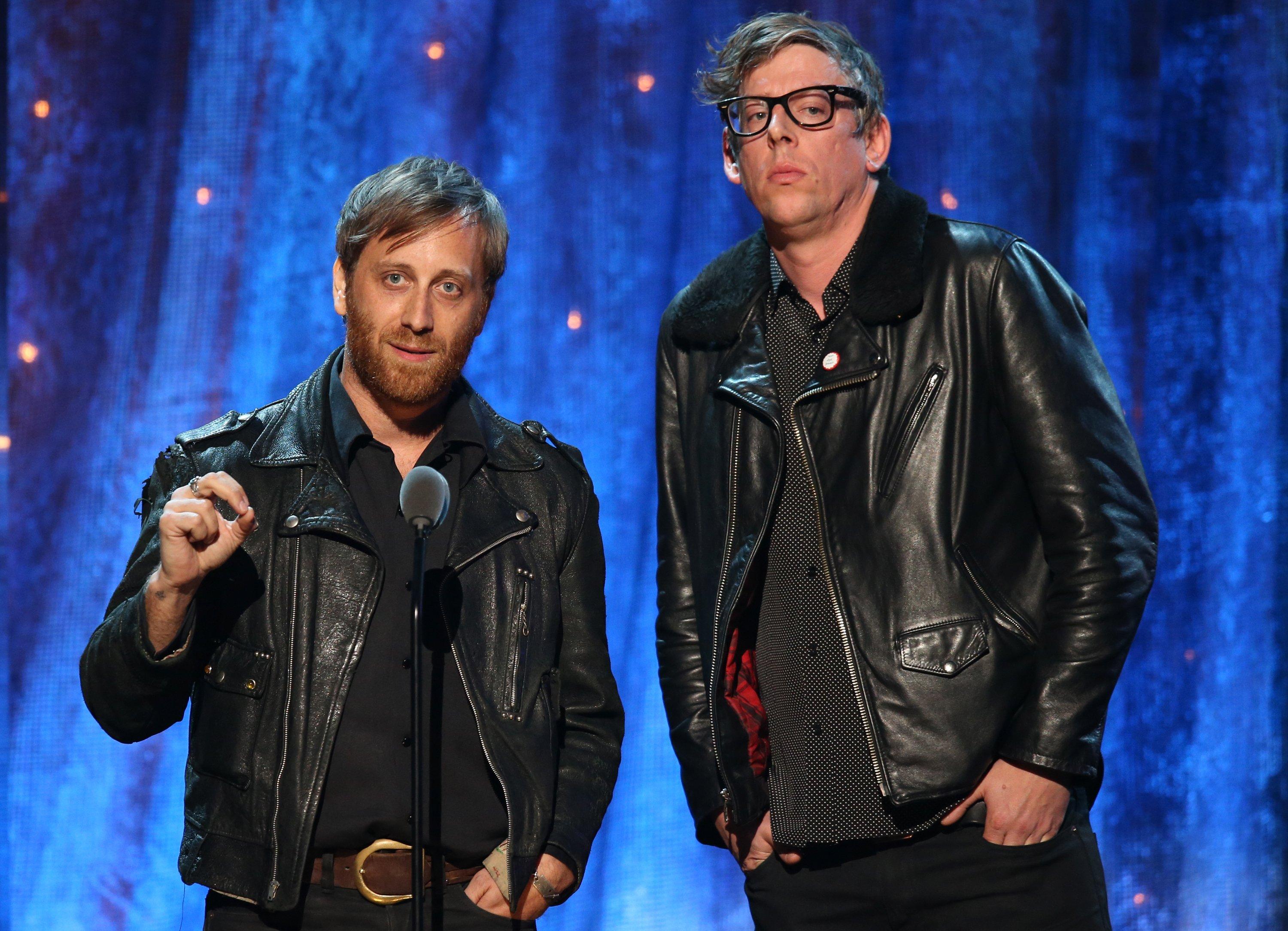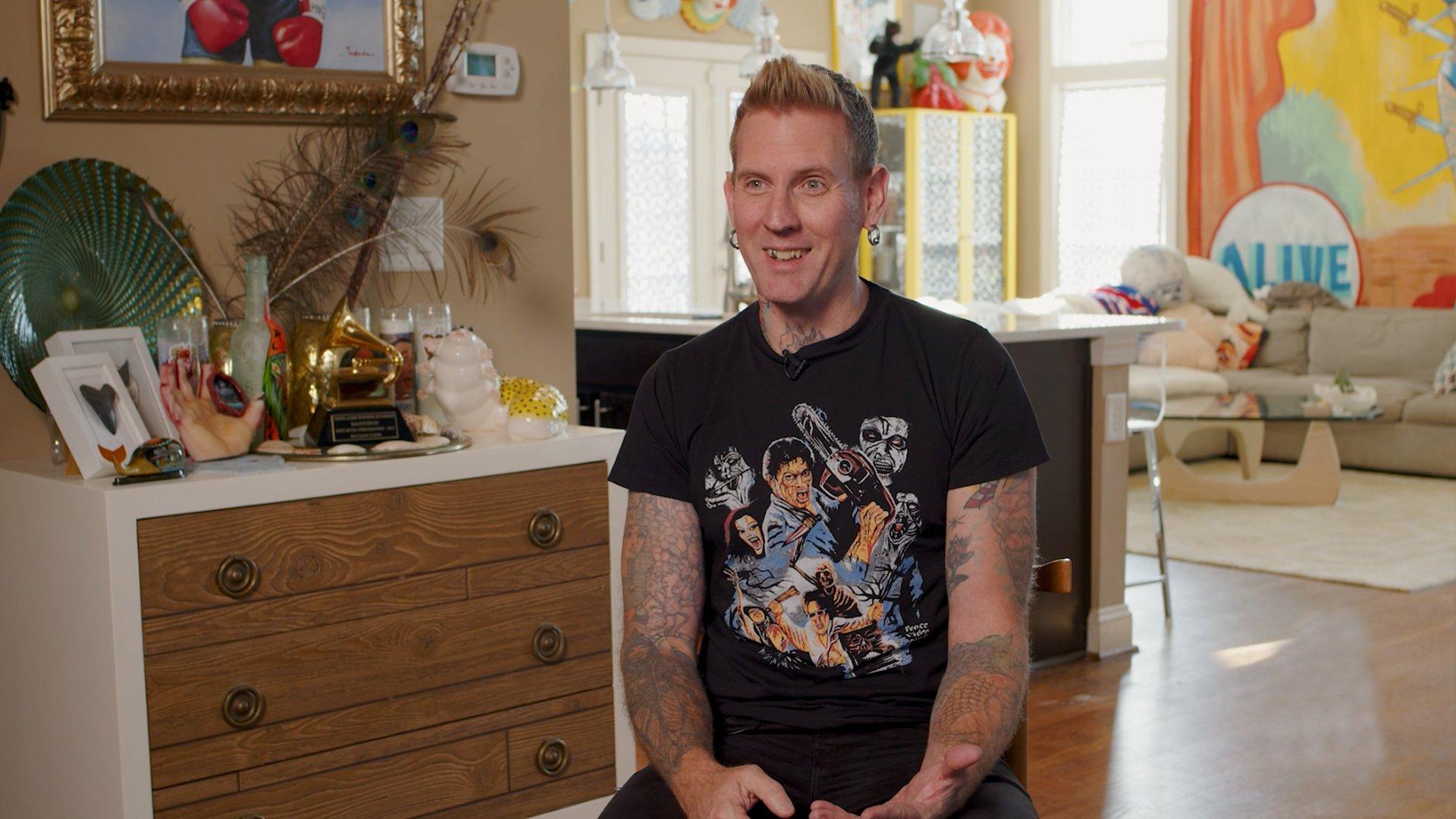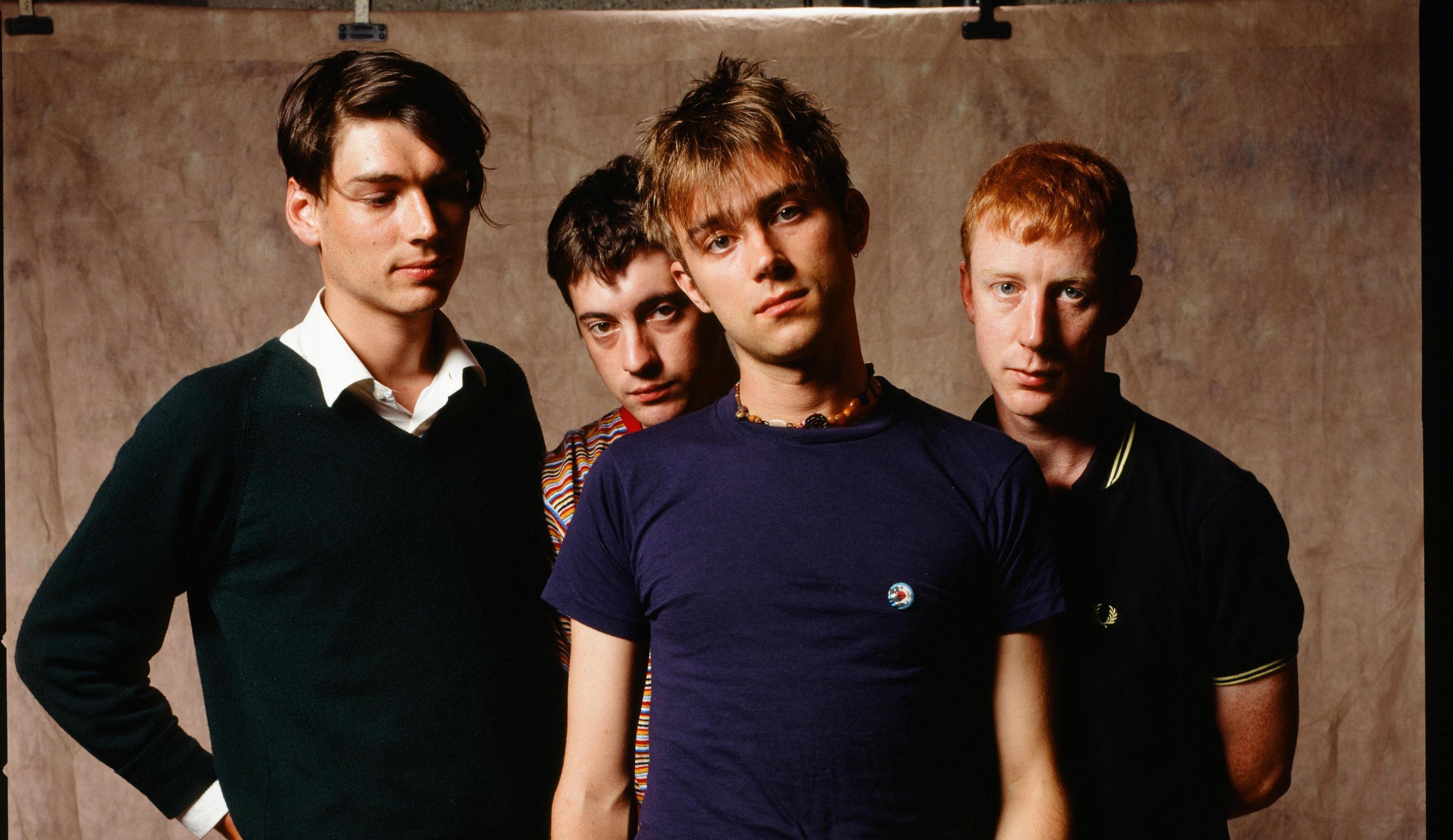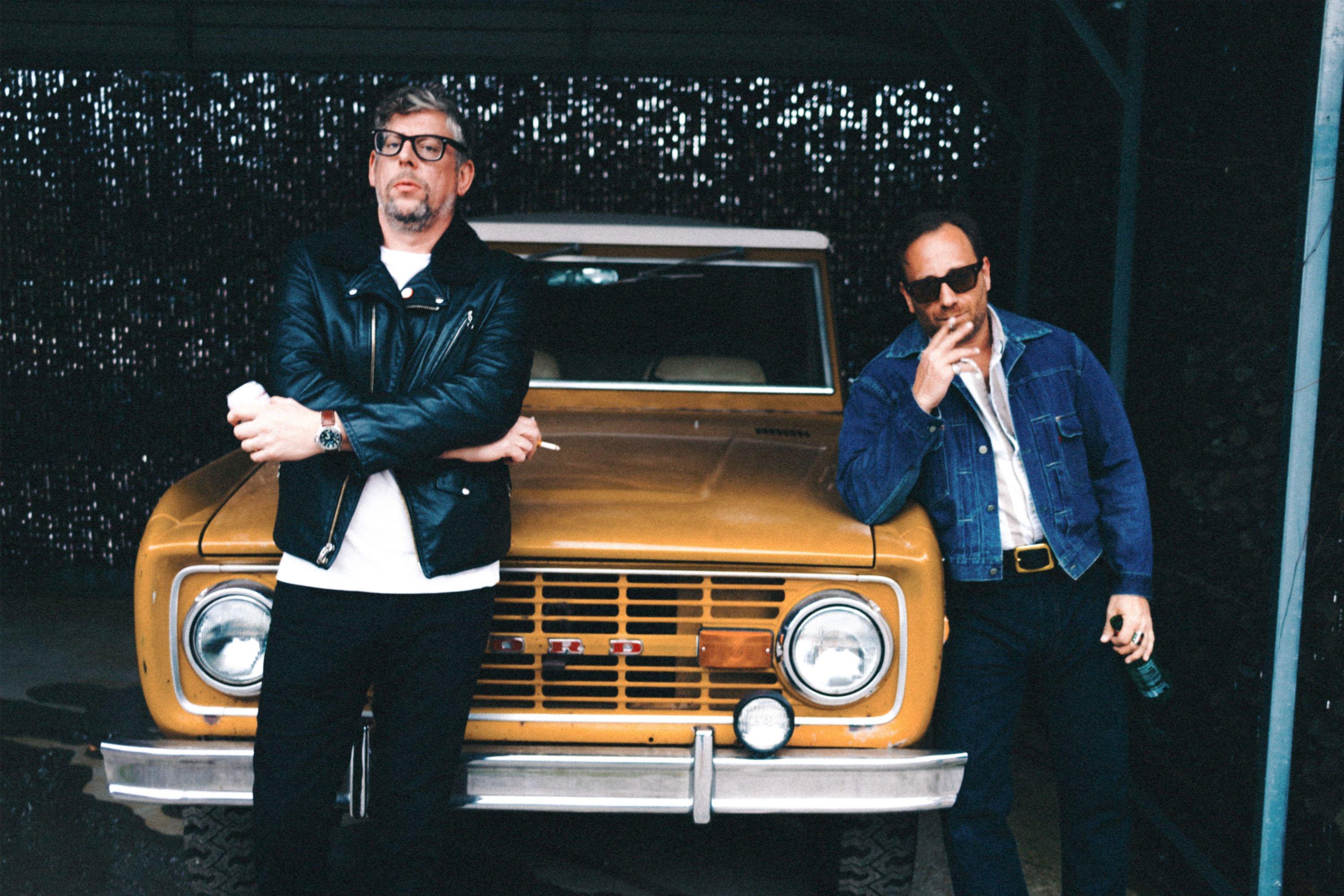Photo: Kevin Kane/WireImage/Getty Images

The Black Keys
news
The Black Keys Announce New Album 'Let's Rock,' Dropping June 28
"When we're together we are The Black Keys, that's where that real magic is," Dan Auerbach said
On March 7, GRAMMY winners The Black Keys released their first new music in five years, a buzzy single called "Hi/Low." A week later, they announced the Let's Rock Tour with Modest Mouse, which travels across North America this fall.
Today, April 25, the alt-rock duo released another new track, "Eagle Birds," and revealed the tour will be in support of a new album. Let's Rock, their ninth studio album, is due out June 28.
The forthcoming LP is their follow-up to 2014's GRAMMY-nominated Turn Blue. In a press release, the bandmates spoke to the back-to-their-roots nature of the album, which is echoed on the two singles.
"When we're together we are The Black Keys, that's where that real magic is, and always has been since we were 16," Dan Auerbach (guitars and lead vocals) wrote. Pat Carney (drums) added, "The record is like a homage to electric guitar. We took a simple approach and trimmed all the fat like we used to."
<iframe width="620" height="349" src="https://www.youtube.com/embed/ImK1NHbrkxg" frameborder="0" allow="accelerometer; autoplay; encrypted-media; gyroscope; picture-in-picture" allowfullscreen></iframe>
The press release also states the album was "written, tracked live and produced by Dan and Pat at Easy Eye Sound," the studio/label Auerbach opened in Nashville in 2010 after they both relocated from Ohio. They recorded their GRAMMY-winning 2011 album El Camino entirely at then-newly opened Easy Eye, and part of Turn Blue at the studio.
The duo begins their previously announced tour on Sept. 23 in Denver, Colo. and closes it out on Nov. 24 in Vancouver, B.C. Tickets are currently on sale for all shows.
Let's Rock is now available for pre-order, including in a limited-edition pink vinyl format.
To Lift Up Young Writers, Dave Eggers Is Auctioning Autographed Setlists

Photo: Courtesy of Brann Dailor
video
Where Do You Keep Your GRAMMY?: Mastodon’s Brann Dailor Shares The Story Of Their Best Metal Performance Track, “Sultan’s Curse”
Mastodon drummer and singer Brann Dailor reveals the metaphor behind the track that snagged him his first golden gramophone, “Sultan’s Curse,” and how winning a GRAMMY was the “American Dream” of his career.
Mastodon's drummer and singer Brann Dailor assures you he did not purchase his shiny golden gramophone at his local shopping mall.
“I won that! I’m telling you. It’s a major award,” he says in the latest episode of Where Do You Keep Your GRAMMY?
The metal musician won his first GRAMMY award for Best Metal Performance for Mastodon's “Sultan’s Curse” at the 2018 GRAMMYs.
“‘Sultan’s Curse’ was the jumping-off point for the whole theme of the album,” he explains. “The protagonist is walking alone in the desert, and the elements have been cursed by a Sultan.”
It’s a metaphor for illness — during the creation of the album, the band’s guitarist Bill Kelliher’s mother had been diagnosed with a brain tumor and bassist Troy Sanders’s wife was battling breast cancer.
For the band, the GRAMMY award represented their version of the American Dream and culmination of their career work. Even if Mastodon didn’t win the award, Dailor was happy to be in the room: “We felt like we weren't supposed to be there in the first place! But it's an incredible moment when they actually read your name."
Press play on the video above to learn the complete story behind Brann Dailor's award for Best Metal Performance, and check back to GRAMMY.com for more new episodes of Where Do You Keep Your GRAMMY?

Photo: Koh Hasebe/Shinko Music/Getty Images
list
7 Ways Blur's 'Parklife' Served As The Genesis Of Britpop
On the heels of their Coachella return, Blur celebrates the 30th anniversary of their opus, 'Parklife,' on April 25. Take a look at how the album helped bring Britpop to the mainstream.
In April 1993, journalist Stuart Maconie coined the term Britpop for a Select magazine article celebrating the UK's fight back against the dominance of American rock. Remarkably, London four-piece Blur weren't even mentioned in the story. And yet, frontman Damon Albarn, guitarist Graham Coxon, bassist Alex James, and drummer Dave Rowntree would provide the catalyst for the scene's mainstream breakthrough.
Just a year later, Blur released what many consider to be Britpop's defining statement. Parklife served as a colorful, vibrant, and incredibly infectious love letter to all things Anglocentric, drawing upon the nation's great cultural heritage while also foreshadowing what was to come. And it instantly struck a chord with homegrown audiences desperate for guitar music that wasn't drowning in abject misery, and better reflected their day-to-day lives.
Remarkably, Albarn had predicted Parklife's success four years earlier. As he declared to music writer David Cavanagh in 1990, "When our third album comes out, our place as the quintessential English band of the '90s will be assured. That is a simple statement of fact."
Three decades after its game-changing release, here's a look at how Parklife forever changed both Blur's career trajectory and the history of British rock.
It Kickstarted Britpop's Greatest Rivalry
In one of those great rock coincidences, Blur's third LP hit the shelves just 24 hours after "Supersonic" gave a then-relative unknown Manchester outfit named Oasis their first ever UK Top 40 single. And the two bands would remain intertwined (perhaps begrudgingly so) from then on, culminating in the most high-profile chart battle in British music history.
You could argue that Oasis' Noel Gallagher threw the first stone, describing Parklife as "Southern England personified" in a manner that suggested it wasn't exactly complimentary. And according to his manager Alan McGee, Definitely Maybe cut "Digsy's Dinner" was written as a deliberate "piss-take of Blur."
An increasingly bitter war of words then broke out in the summer of 1995 as the "Country House" versus "Roll With It" war swept the nation. Blur emerged victorious, although Oasis had the last laugh when (What's The Story) Morning Glory spent 10 weeks atop the UK album chart.
It Brought Storytelling Back To Indie Pop
Heavily inspired by Martin Amis novel London Fields, Parklife was inhabited by a cast of intriguing fictional characters, essentially doubling up as a series of short stories. "Tracy Jacks," for example, is about a golf-obsessed civil servant who ends up getting arrested for public indecency before bulldozing his own house.
"Magic America" is the tale of Bill Barret, a Brit who commits to a life of excess during a Stateside holiday ("Took a cab to the shopping malls/ Bought and ate until he could do neither anymore"), while "Clover Over Dover" explores the mindset of a manipulative boyfriend threatening to jumping off the titular white cliffs.
Over the following 18 months, everything from Pulp's "Common People" and Space's "Neighbourhood" to Supergrass' "Caught by the Fuzz" and The Boo Radleys' "It's Lulu" were combining classic British guitar pop with witty Mike Leigh-esque vignettes of modern life.
It Originated The Big Indie Ballad
Dramatic ballads aren't necessarily the first thing that come to mind with Parklife, a record famed for its jaunty, "knees-up Mother Brown" ditties. But it boasts two examples: "To The End," an alternate Bond theme featuring a burst of Gallic flair from Stereolab's Laetitia Sadler, and the swoonsome "This Is A Low." Turns out the "mystical lager-eater" the record was designed to embody could also get a little vulnerable from time to time.
This appeared to give all of their laddish peers some pause for thought. Oasis, the most fervent advocates of the "cigarettes and alcohol" lifestyle, later scored their biggest hit with acoustic ballad "Wonderwall." And bands including Cast ("Walkaway"), Shed Seven ("Chasing Rainbows") and Menswear ("Being Brave") all enjoyed UK hits revealing their softer sides. No doubt Coldplay, Travis, and every other sensitive post-Britpop outfit that emerged in the late 1990s were taking notes, too.
It Paid Respect To The Greats
The Britpop scene was renowned for its slavish devotion to the first time British guitar bands ruled the airwaves, the Swinging Sixties. Oasis freely admitted they modeled themselves on the Beatles, while the likes of Ocean Colour Scene, Kula Shaker and The Paul Weller all released albums that sounded like they'd been discovered in a vintage record shop.
And while Blur would later distance themselves from the past with a sense of invention (which Albarn would also parlay into his various side projects, including the virtual band Gorillaz), they were more than happy to get all nostalgic on Parklife. See "Far Out," their only track to feature James on lead vocal, which resembled the trippy psychedelia of Pink Floyd in their Syd Barrett era, and the Sgt. Pepper-esque brassy instrumental "The Debt Collector," while there are also echoes of the Walker Brothers, The Kinks, and Small Faces. Suddenly, retro was the new cool.
It Turned Blur Into Britain's Biggest Guitar Band
The UK Top 10 success of 1991's "There's No Other Way" proved to be something of a false start for Blur, with the band soon falling by the wayside like every other baggy pop outfit that emerged at the turn of the decade. "Popscene," the 1992 single intended to revolutionize both their career and British guitar music in general, stalled at No. 32, while 1993 sophomore Modern Life is Rubbish sold just 40,000 copies.
But Parklife single-handedly turned Blur into Britain's biggest guitar band, reaching No. 1 in their homeland, spending 82 weeks in the Top 40, and eventually becoming a million-seller. It went on to pick up four BRITs, a Mercury Prize nomination, and has been recognized as an all-time great by Spin, Pitchfork, and Rolling Stone. Further proof of its glowing reputation came in 2009 when Royal Mail selected it as one of 10 albums worthy of commemorating on a postage stamp.
It Spawned A String Of Classic Singles
Parklife's campaign was kicked off in March 1994 with "Girls and Boys," a glorious dissection of British vacationers — which, surprisingly in the days when genre-hopping was frowned upon — evoked the '80s synth-pop of Duran Duran and Pet Shop Boys. Rowntree was even replaced by a drum machine, not that he particularly minded, luckily.
This indie floorfiller was followed up by the hugely underrated "To The End" and then the much-quoted title track. Everything about "Parklife" the song is larger than life: the Cockney geezer narration from Quadrophenia's Phil Daniels, the festival-friendly sing-along chorus, and the brightly colored video in which James — perhaps tipping his hat to Queen's "I Want to Break Free" -– donned soap opera drag. But fourth release "End of a Century," a melancholic tale of domestic drudgery complete with mournful trombone solo, once again proved there was a depth beyond their cheeky chappy personas.
It Made Brits Proud To Be British Again
Unable to connect with the oppressive angst and flannel shirts of the grunge movement that had plagued their first major North American tour in 1992, Blur first started to embrace their inherent Englishness on the following year's Modern Life is Rubbish. Unfortunately, this throwback to the original British Invasion was met with a resounding shrug of the shoulders on both sides of the Atlantic.
Undeterred, however, the band doubled down on all things Anglocentric on its follow-up, from its original title of London, to its greyhound racing cover art, to its celebrations of bank holidays, Club 18-30 holidays, and shipping forecasts. This time around, they managed to capture the zeitgeist (at home, at least), as the rise of New Labour and the forthcoming hosting of Euro '96 made everyone proud to be British again. Within 12 months, the UK charts were littered with homegrown guitar bands selling the idea of the English dream — and it all started with Parklife.

Photo: Todd Owyoung/NBC via Getty Images
interview
On 'Little Rope,' Sleater-Kinney Still Wear Their Hearts On Their Sleeves
Sleater-Kinney's latest album delves into profound vulnerability, crafted in the wake of personal loss and global upheaval. 'Little Rope' showcases the band's enduring spirit, close friendship, and the approach that's kept them relevant over time.
Using lively, raw instrumentals as a vehicle for emotional catharsis, Sleater-Kinney’s Little Rope takes the lead as one of their most vulnerable projects to date.
The "Dig Me Out" singers approach their 11th studio album with a fresh perspective, influenced by their experiences during the pandemic. Despite the departure of drummer Janet Weiss in 2019, the band maintains their iconic post-riot grrrl take on rock music. Carrie Brownstein and Corin Tucker infuse Little Rope with reflective lyrics and raw energy, mirroring their personal growth and resilience.
While working on the album one day, Brownstein received a call with news that nobody ever wants to hear, nor expects. She had been informed that her mother and stepfather had been involved in a fatal car accident while on vacation in Italy. Faced with grief and a sense of unfamiliarity, the band turned to something that always brought them comfort: making music. Little Rope was born.
Despite such a tragic, major life change and trying to make it through a global pandemic, Sleater-Kinney’s motive remains consistent.
"We hope to find people where they're at," Tucker explains to GRAMMY.com. "And it seems like we have, in each stage of someone’s life."
After hosting a GRAMMY U SoundChecks event with the Pacific Northwest Chapter of GRAMMY U, Sleater-Kinney sat down with GRAMMY.com to talk about their perspective on the ever-changing industry and the legendary bands they pull inspiration from.
This interview has been edited for clarity.
It has been almost 30 years since you all released your first album. In what ways has Sleater-Kinney changed since then and what has stayed consistent?
Corin Tucker: We still try to write songs that are emotional and that reach people. Our songwriting has developed over the years and I think we have different methodologies for writing. But, really the most important point of a song is that it makes people feel something. We still try to judge what we do by the same metric as we did 30 years ago.
Carrie Brownstein: One thing we set out to do is to have a unique sound and I think we created a sonic language with each other that we've tried to maintain, but also push the narrative forward and challenge ourselves with each album. That's been consistent from the beginning, we never — even in the early years — wanted one album to sound like the last one. Things change and the industry changes. We just try to stay true to ourselves, but also adapt.
Are there any of your early projects that you feel still resonate to this day?
Corin Tucker: The funny thing about streaming is that people are finding some of those older songs and really getting into them. We found out at the end of last year that people were really into one or two songs off of our very first self-titled record. A really nice thing about having your music available digitally is that it's available to everyone all over the world.
Path of Wellness (2021) was self-produced, as it was made during the peak of the COVID-19 pandemic and Little Rope (2024) was produced by GRAMMY-winning producer John Congleton. What was it like going from a self-produced project to having John on the next project? Was there a certain reason you chose to work with John?
Carrie Brownstein: Self-producing for us was very anomalous. We've always worked with producers and one of the reasons is to just have an outside perspective — somebody to come in and be the tiebreaker or to just bounce ideas off of. So, it was kind of a no-brainer to return to a producer after the solitary of the pandemic.
We have always been fans of John Congleton's work. We come from similar backgrounds and have been in talks to work with him for a while. Fortunately for this album, it worked out and we felt like these songs would be really well served by his productions.
Could you tell us a little bit about your dynamic as a music duo? When writing songs, do you both try to work on them 50/50 or is it on-and-off, where one of you may take the lead for certain songs? And what was this collaboration like specifically with Little Rope?
Corin Tucker: Our goal is always to make the song as strong as it can be. We’ve worked together long enough to know that that's the most important thing. Sometimes a song is more an idea of one or the other, and you need to wait until they’ve fleshed it out to come in with your parts. We have a bunch of different modalities and we just try to keep the conversation going. It's a lot about communication – it's an ongoing constant conversation between the two of us on where the song is at and what we think it might need.
Can you share any standout memories or experiences from when you were writing Little Rope?
Carrie Brownstein: My friend has an apartment in Downtown Portland and he was out of town. So, he let us use the space as a writing studio. And neither of us live in Downtown Portland, so it was interesting to be in this highrise in Portland looking out over the city — sort of being in conversation with the city and changing the landscape in which we were writing was nice to have.
As Pacific Northwest natives, how do you see your Pacific Northwest roots stick out in your music?
Corin Tucker: A lot of the sounds from the historic bands you can hear in our music. You can hear Nirvana, you can hear the Fastbacks, so you can hear so many of those Pacific Northwest musicians. They were bands that we grew up with and bands that we still try and emulate with what we do.
I feel like a good number of Sleater-Kinney fans have stayed fans and grown with you all over the years. What about your music and your brand do you think resonates with people even in different stages of their lives, and how did you foster this dynamic?
Carrie Brownstein: Sleater-Kinney’s a very earnest band. We wear our hearts on our sleeves and I think our audience appreciates that rawness and vulnerability. It's emotional music.
We have a lot of younger and newer fans. I think they relate to the emotionality and the honesty in the music, so that’s what we try to stick with.
You have said that The Showbox is one of your favorite venues to play at in Seattle. How does it feel being back at The Showbox for two sold-out shows?
Carrie Brownstein: We really enjoy the intimacy of a smaller venue, allowing the fans to get a little closer to the stage and feeling more connected with them. It's just nice to feel a sense of history, a through line with our career and our relationship with the city. We're really excited to be here.
I’m curious to know how your fans reacted to Little Rope. Have you noticed any common reactions to the project? Or any particular responses that have stood out?
Corin Tucker: People really relate to the emotion in the music. We've gotten a lot of people saying that it helped them through a hard time. Having that impact on people is pretty special when they feel like it's okay to be emotional and process things with music.
Lastly, you have the rest of your international tour to go, but what else is coming up for Sleater-Kinney?
Corin Tucker: We're very excited to play shows internationally. There may be some cool stuff coming up that maybe hasn't been announced yet, but we're looking forward to more touring.
Carrie Brownstein: For an album cycle, it's almost two years and so, for the most part it will be, it'll be touring and then we'll write something else.

Photo: Larry Niehues
list
11 Black Keys Songs To Know With New Album 'Ohio Players': From "I Got Mine" To "Beautiful People (Stay High)"
The Black Keys' discography is chock full of smooth, yet deliciously grungy top-down jams. With their new album, 'Ohio Players,' out now, press play on 11 essential songs by the four-time GRAMMY winners.
Two guys can sure make a lot of noise. That's the throughline when it comes to Dan Auerbach and Patrick Carney's brotherhood in their long-running indie-garage-blues band the Black Keys — but that noise doesn't just come from their lungs and hands.
Sometimes, they're channeling the gut-bucket sound of hill country blues, like on their 2021 covers album Delta Kream. Other times, that noise has been refracted through the lens of outside producer Danger Mouse.
And on their new album, Ohio Players — out today — the once-musically insular Auerbach and Carney have opened up that noise to collaborators, like Noel Gallagher, Dan "the Automator" Nakamura, superproducer Greg Kurstin, and most prominently, Beck. (He co-wrote seven songs on the album; he sings lead on "Paper Crown," which also features Juicy J of Three Six Mafia.)
"We had this epiphany: 'We can call our friends to help us make music,'" Carney said in a statement — adding that this is especially rich, given they always co-write with others. "What we wanted to accomplish with this record was make something that was fun. And something that most bands 20 years into their career don't make, which is an approachable, fun record that is also cool."
As a ramp-up to Ohio Players, take a spin through 11 great songs from the four-time GRAMMY winners and 13-time nominees' catalog — whether you're a newbie or a longtime player.
"Girl is On My Mind" (Rubber Factory, 2004)
If you've heard the Black Keys' breakout hits like "Tighten Up," but prefer their sound a little rawer, all their early, pre-Attack and Release records should vibe with you. "Girl is On My Mind" has all their hallmarks — a sexy crawl, controlled-demolition drums, an abundant lo-fi buzz.
"I Got Mine" (Attack & Release, 2008)
Attack and Release is an album of two important Keys firsts: their first in a professional studio, and their first with Danger Mouse. With said six-time GRAMMY winner and 22-time nominee at the helm, their sound gains depth and resonance — yet remains gloriously stripped down.
"Tighten Up" (Brothers, 2010)
This is where the Black Keys zoomed up to the top, and the tired "car commercial rock" criticisms really got rolling. (Maybe so, but they do it better than anyone.) When Carney's four-on-the-floor rhythms collide with Auerbach's effortless melodic gifts, magic transpires.
"Howlin' For You" (Brothers)
The Keys' discography is something of one uninterrupted, glorious buzz — but at this point, they were teasing new colors out of it left and right. The fuzzy, buzzy "Howlin' For You" represents the flipside of Brothers — a more finicky, angular and wired feel.
"Lonely Boy" (El Camino, 2011)
After the smash success of Brothers, Auerbach and Carney returned with the even more brazen and brassy El Camino — a direct shot of Keysiness to the arm. "Am I born to bleed?
Any old time, you keep me waitin'," Auerbach pleads in this rollicking, uptempo favorite.
"Gold on the Ceiling" (El Camino, 2011)
Ain't it wild that for a decade, there were equal and opposite rock acts called the Black Keys and the White Stripes? While both have always been loath to be lumped in with each other — Auerbach and White have a history of bad blood — "Gold on the Ceiling" shows that Auerbach's serrated fuzz could occasionally rip a hole in the firmament, much like his sometime rival.
"Fever" (Turn Blue, 2014)
After the rush of riotous success surrounding Brothers and El Camino, Auerbach and Carney took a two-year cooldown to produce for other artists. The album they made upon their return was moodier and more midtempo: "Fever" is one laser-focused example of this approach.
"Lo/Hi" (Let's Rock, 2019)
As they approached 20 years as a band, the Black Keys relaxed into their own skin with Let's Rock, a happily middle-of-the-road offering with idiosyncratic charm galore. (The title is a reference to convicted murderer Edmund Zagorski's last words before getting the chair.) "Lo/Hi" is a deep, satisfying rumble from the core of their well-explored aural aesthetic.
"Shine a Little Light" (Let's Rock, 2019)
This equally appealing Let's Rock cut is commensurately dreamy and guttural, showing off their still-sharp dynamics over a gospel-like heft.
"Wild Child" (Dropout Boogie, 2022)
Dropout Boogie isn't altogether different from its predecessor — again, this is the Black Keys, and it's all a continuum. But the choruses are even sharper — and the underdog video, where Auerbach and Carney get verbally torn apart by public school staff, is just as memorable.
"Beautiful People (Stay High)" (Ohio Players, 2024)
A sizable leap forward from the already very good Let's Rock and Dropout Boogie, Ohio Players shows not only their range more than two decades in, but their chemistry with their old friends.
And it's all boiled into "Beautiful People (Stay High)" — which, admittedly, leans on something on a shopworn lyrical trope about getting high and never coming down. But it's impossible to quibble with that when that indelible chorus shakes the cheap seats.
It serves as a reminder that the Black Keys draw from a universal canon of blues, rock, psychedelia and much more — and it's less what they say than how they say it.
